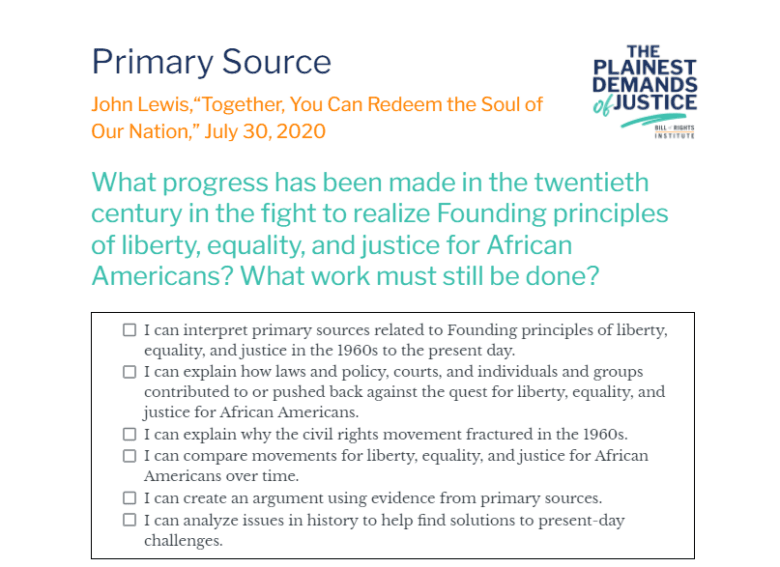John Lewis, “Together, You Can Redeem the Soul of Our Nation”, 2020
What progress has been made in the twentieth century in the fight to realize Founding principles of liberty, equality, and justice for African Americans? What work must still be done?
- I can interpret primary sources related to Founding principles of liberty, equality, and justice in the 1960s to the present day.
- I can explain how laws and policy, courts, and individuals and groups contributed to or pushed back against the quest for liberty, equality, and justice for African Americans.
- I can explain why the civil rights movement fractured in the 1960s.
- I can compare movements for liberty, equality, and justice for African Americans over time.
- I can create an argument using evidence from primary sources.
- I can analyze issues in history to help find solutions to present-day challenges.
Building Context
John Lewis, a founder of SNCC and long-serving member of Congress, instructed that a final opinion piece he had written be published after his death. The following essay appeared in The New York Times after his passing. Lewis reflected on his own life, his role in the civil rights movement, and ways in which the next generation might continue the movement’s work.
John Lewis, “Together, You Can Redeem the Soul of Our Nation,” July 30, 2020
Source: https://www.nytimes.com/2020/07/30/opinion/john-lewis-civil-rights-america.html
. . . Ordinary people with extraordinary vision can redeem the soul of America by getting in what I call good trouble, necessary trouble. Voting and participating in the democratic process are key. The vote is the most powerful nonviolent change agent you have in a democratic society. You must use it because it is not guaranteed. You can lose it.
You must also study and learn the lessons of history because humanity has been involved in this soul-wrenching, existential struggle for a very long time. People on every continent have stood in your shoes, through decades and centuries before you. The truth does not change, and that is why the answers worked out long ago can help you find solutions to the challenges of our time. Continue to build union between movements stretching across the globe because we must put away our willingness to profit from the exploitation of others.
Though I may not be here with you, I urge you to answer the highest calling of your heart and stand up for what you truly believe. In my life I have done all I can to demonstrate that the way of peace, the way of love and nonviolence is the more excellent way. Now it is your turn to let freedom ring.
When historians pick up their pens to write the story of the 21st century, let them say that it was your generation who laid down the heavy burdens of hate at last and that peace finally triumphed over violence, aggression, and war. So I say to you, walk with the wind, brothers and sisters, and let the spirit of peace and the power of everlasting love be your guide.
Comprehension and Analysis Questions
- What is the most powerful nonviolent “change agent” to combat discrimination, according to Lewis? Why would he say this?
- Why must students look to history, according to Lewis?
- What do Lewis’s final words challenge the next generation to do?
- Is Lewis optimistic about the future? Explain. Do you agree with his view of the future?
